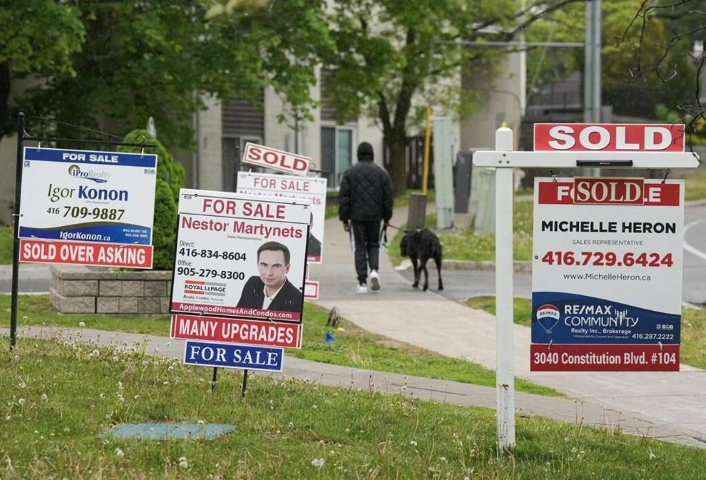
A person walks past multiple for-sale and sold real estate signs in Mississauga, Ont., on Wednesday, May 24, 2023. THE CANADIAN PRESS/Nathan Denett
In recent years, incidents of title and mortgage fraud have been on the rise in Canada, causing concerns among homeowners and real estate professionals. These types of fraud involve unauthorized changes to property ownership or the acquisition of mortgages under false pretenses. The implications of such fraud can be financially and emotionally devastating for the victims involved.
Picture this scenario: You receive a letter from a bank claiming that you are in default on a mortgage you never took out. Shocked and confused, you realize that someone may have fraudulently obtained a mortgage using your identity. This situation, although seemingly far-fetched, is becoming increasingly common in Canada, according to experts in the field.
Title fraud occurs when the ownership of a property is unlawfully altered or forged documents are used to sell or refinance a property without the owner's knowledge or consent. Last year, two cases in Toronto gained widespread attention when homes were listed for sale without the owners' awareness, with one property even being sold to an unsuspecting buyer.
While these cases may be extreme, mortgage fraud is more prevalent and typically involves individuals posing as legitimate homeowners to secure mortgages under false pretenses. Using counterfeit identification documents and fabricated employment histories, fraudsters deceive lenders into granting them mortgages. The consequences of such actions are dire, as unsuspecting homeowners may find themselves in default on loans they never took out.
Daniel La Gamba, a real estate lawyer, emphasizes that despite the existing safeguards, fraudsters have become increasingly adept at exploiting vulnerabilities in the system. Recognizing fraudulent activity often relies on intuition and careful scrutiny of documentation, as fraudsters employ sophisticated methods to evade detection.
The financial and emotional toll of falling victim to mortgage fraud can be substantial. Homeowners may face significant legal fees and prolonged battles to clear their names and reclaim their properties. However, having title insurance can provide crucial protection in such situations, as insurers step in to rectify the matter and cover associated expenses.
FCT, a title insurance company, reports an alarming increase in attempted cases of title and mortgage fraud, highlighting the growing sophistication of fraudsters in exploiting vulnerabilities in the real estate sector. The allure of substantial financial gains incentivizes fraudsters to target vulnerable individuals, including newcomers to Canada and elderly homeowners.
Technology has also played a role in facilitating fraudulent activities, with fraudsters using digital tools to replicate identification documents with alarming accuracy. The prevalence of remote transactions during the pandemic has further exacerbated the risk of fraudulent activities, as reliance on digital verification methods has increased.
To combat mortgage fraud, regulatory authorities have implemented guidelines aimed at enhancing oversight and accountability within the real estate industry. Mortgage brokers are now required to adopt measures to detect and prevent fraudulent activities, including multi-factor authentication and thorough verification of client information.
The Financial Services Regulatory Authority of Ontario has issued guidance to mortgage brokers, emphasizing the importance of conducting business ethically and identifying potential red flags indicative of fraudulent activities. Failure to comply with these guidelines may result in enforcement actions, including sanctions and penalties.
In conclusion, the prevalence of title and mortgage fraud in Canada poses significant challenges for homeowners and real estate professionals alike. Vigilance, awareness, and adherence to regulatory guidelines are essential in mitigating the risks associated with fraudulent activities in the real estate sector.















